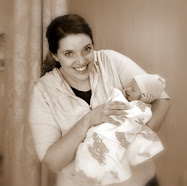By SUSAN DONALDSON JAMES
July 28, 2008 —
Pregnant with her first child, Julie Speier prepared to deliver with the help of a midwife at a New York City birthing center. But in June -- three weeks before the due date and 600 miles from home -- her water broke.
Speier gave birth at a Cincinnati hospital, where she and her fiancé tried desperately to keep the birth natural -- a vaginal delivery without pain medication.
"I believe in the power of nature and that creation is next to perfect," said Speier, a 34-year-old yoga teacher. "I knew what I wanted and I had the confidence."
But as labor pains increased and Speier asked about breathing techniques, the doctor replied, "How do I know? I've only ever done two [natural childbirths]."
Today, natural childbirth is a medical anomaly in the United States, so much so that doctors are often thrown off guard by a determined woman like Speier.
A small but growing number of women who seek to avoid aggressive medical techniques like induced labor, epidural blocks and Caesarean sections find they are a lone voice among their friends and doctors.
"All of my friends think I am a little nuts," Speier said. "They say why would you do it natural?"
Speier said her own mother told her traumatic stories of her brother's breech birth. "Everyone I know has an 'I can top you' gory birthing story."
Pre-planned Caesareans are also in vogue. Women want to avoid future complications of multiple vaginal births, like uterine or bladder collapse. And today's body-conscious women worry needlessly about loss of muscle-tone.
'Too Posh to Push'
With the latest feminine plastic surgery rage -- so-called "pimping the vadge" -- some women prefer what the British call the "Posh push," referring to the planned Caesarean births of soccer celebrity David and Victoria Beckham's three boys.
Like the generation that pioneered the first wave of feminism in the 1970s, women like Speier want to take an active role in their health care. They view childbirth a normal, healthy process that requires time, patience, strength and endurance.
But in the decades since, new technologies, the rising cost of malpractice insurance and even the changing attitudes of women have all contributed to the near-demise of natural childbirth.
"It's a little tsunami," said Dr. Ben Sachs, chief of obstetrics at Tulane University in Louisiana. "All these forces are coming together at the same time."
Both doctors and midwives have been hit hard with the high cost of liability insurance. All agree they must take on more patients to keep their practices lucrative, giving them less time to wait out a long labor.
Doctors more frequently induce labor, using synthetic hormones like pitocin to strengthen and quicken labor, an intervention that was once used only as a "last resort."
But induction also heightens the pain of labor and can precipitate the use an epidural -- an injection in the lower back that blocks the pain of contractions while the woman is awake. And some say that, in turn, can delay the pushing mechanism and even trigger the need for a Caesarean.
Induction rates rose 5 percent in 2005 to 22.3 percent of all births -- double the rate since 1990, according to the National Center for Health Statistics. Caesarean deliveries have also jumped -- to more than 30 percent of all births, a 46 percent rise in the last decade and a 4 percent increase over the 2004 record.
Hospital Costs Spiraling
So, too, have hospital costs spiraled, and doctors say the first cuts are in obstetrical care. Hospitals in many parts of the country can now be sued for malpractice, further eroding support for what is perceived as the economic risk of natural childbirth.
"Childbirth doesn't get the attention and respect it should," Sachs told ABCNews.com.
But he said it isn't only doctors driving the medicalization of pregnancy, but women themselves.
Many women are having their babies older, necessitating more Caesarean sections for high-risk pregnancies. Younger women who fear the pain or the cosmetic consequences of a vaginal birth pre-plan a Caesarean with their doctor's blessing.
"The question is, has it done harm to women or the experience of childbirth?" Sachs asked. "Positive things are coming out of this. There is a concentration on patient safety and reducing medical errors."
But a national survey by Childbirth Connection found just one incidence in 1,600 of a planned c-section, for no underlying medical reason. The non-profit also said the rate of Caesareans is going up in all groups of birthing women.
"The American healthcare system is increasingly dependent upon medical interventions to address what is, most often, a normal and safe physiological process," said Rebecca Benghiat, executive director of the New Space for Women's Health in New York City, where the Caesarean rate has just hit 31 percent of all births.
"Quite often, women are not fully informed of the risks associated with commonly performed obstetrical interventions, nor do they know there are options beyond hospital birth," she said.
But, childbirth advocates say that for women with uncomplicated and low-risk pregnancies, a natural birth can be safe.
"This is a big mess and no one is sure how we got there," said Erica Lyon, director of the education center RealBirth in New York City and author of the "The Big Book of Birth."
"We had a wonderful movement in the 1970s when women wanted to take control of their bodies," she told ABCNews.com "When we got to the eighties, we assumed it was fixed. But it wasn't."
Today, about 95 percent of all births occur in hospitals, 3 percent in birthing centers and only 1 percent at home, according to the National Center for Health Statistics. About 6 percent of all births are attended by midwives, but those numbers are dropping as their liability insurance rises.
Natural childbirth experts say they have seen a modest increase in interest in natural childbirth following a recent film by actress Ricki Lake, who gave birth at home with the help of a midwife.
Lyon charges that hospitals have "no standards of practice," bowing to the demands of overburdened doctors and women who don't understand the benefits of natural childbirth -- quicker recovery time, better baby bonding and more successful breastfeeding.
"It's good technology, but we do it over-aggressively," she said. "What we tend to do is treat it as an absolute rather than with a tiny bit of healthy skepticism."
But natural "means different things to different people," according to Dr. Lauren Streicher, an obstetrician gynecologist at Northwestern Memorial Hospital in Chicago, who said current medical practices are safe and what women want.
'Go Ahead and Medicalize It'
"Most women say go ahead and medicalize it," she told ABCNews.com. "Low-intervention birth is on the decline because people are no longer interested. They say, 'I want an epidural and a C-section is fine for me.'"
Streicher opted for "zero pain" in her own pregnancy and planned to get an epidural even before her first contraction. But when her water broke weeks early, her anesthesiologist was on a ski holiday and her obstetrician was having a hysterectomy.
"I didn't panic," she said. "I had three or four very painful contractions, but after that it was a very lovely, easy labor and I pushed her [daughter] out."
She also agrees with women who say "there's no shame in doing a C-section."
But Dr. Louis Weinstein, chair of the obstetrics and gynecology department at Thomas Jefferson University, points out that although the mortality rate is "very low," a Caesarean is 6 to 20 times more dangerous than a vaginal delivery.
Though he will agree to an elective Caesaean, he makes sure the woman is informed and understands all the risks.
Weinstein also warned of the misuse of induction hormones, which he says studies show are the second most common source of medical errors.
Still, he said the use of epidurals, which carries its own risks, is safe when properly administered. "With all due respect, labor is uncomfortable and the reason someone coined it is you are working your rear end off," he told ABCNews.com. "Labor is very, very uncomfortable."
"I believe in choice, but this is a women's issue," Weinstein said. "We get more nasty letters that we didn't have time to put in the epidural."
But midwives say women are not encouraged by their doctors to explore alternatives such as birthing centers, where low-risk women can give deliver naturally, balancing technology with a home-like environment. There, no pain medication in administered, but women receive the support of a trained midwife and an assistant, who work with doctors to ensure safety. A warm and intimate environment -- and sometimes hot tubs and whirlpools -- provide a soothing atmosphere to experience the birth naturally.
"Most women don't know about their choices," said Asya Portnaya, 29, and a certified midwife from the Brooklyn Birthing Center in New York. "They are only aware of a hospital birth and just go as the doctor tells them to."
Midwives Show Lower Caesarean Rate
According to the Public Citizen Health Research Group, certified nurse-midwives have a Cesarean section rate of 11.6 percent compared with a national average of 23.3 percent.
"In a hospital, you get lost in the system, even as a midwife," she said. "If you take a child birth class in the hospital, they don't talk about natural birth as much. They talk about the epidural and the whole system supports an unnatural birth. You can't fight that."
Meanwhile, Julie Speier fought hard to see that the Cincinnati hospital team respected her wishes for a natural childbirth.
When the doctor seemed unable to guide the process, Speier's fiancé called a midwife friend and relayed her instructions to the doctor.
"At one point, the baby's head came out and the doctor pulled, but I said, 'Don't pull the baby, wait!'," she said. "Every doctor and nurse we spoke to knew it was important for me to have a natural childbirth. It was hard for them, but they stood back."
Despite the initial drama, Aine Joy, now 7 weeks old, was born healthy. Now ensconced in the joys of parenthood, Speier said she feels more empowered after going through the birth naturally.
"I have more faith in my body than in medical systems," she said. "This is what a woman's body is meant to do."
Cloe Shasha contributed to research in this report.



No comments:
Post a Comment